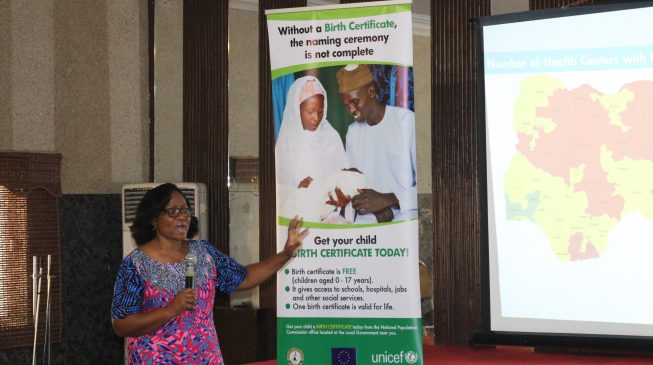
It was not impossible that the media personalities at the Media Dialogue on Birth Registration held in Kano on August 15 and 16 did not know exactly what awaited them before their arrival at the Tahir Guest Palace venue.
But in the vast hall stood two rolled-up banners embossed with the photograph of parents happily displaying their new baby with clear messages: “Without birth certificate the naming ceremony is incomplete”, “Get your child a birth certificate today”, “Birth certificate is free for children aged 0-17 years”, “Birth certificate gives access to schools, hospitals, jobs and other social services”, “One birth certificate is valid for life”. At the bottom of the banners also depicted clearly that the messages were powered by the National Population Commission, European Union and UNICEF, ostensibly to rub in the importance attached to birth registration in Nigeria.
At this juncture, the media personalities at the Dialogue were in no more fuss with regard to the job at hand and the enormity of the task on their shoulders. But just in case they still harboured any fuss whatsoever, the UNICEF’s Communication Specialist, Mr. Geoffrey Njoku, cleared the air: He said the Dialogue was designed to, among other aims, “provide the media with information on the current situation of birth registration in Nigeria, work with media partners to develop story angles on birth registration and work with media partners to develop key messages on birth registration.”
UNICEF’s Child Protection Specialist, Mrs. Sharon Oladiji, took the floor soon after to make her presentation which left the over 50 participants at the Dialogue spell-bound.
Oladiji, who easily combined passion with expertise, averred that although birth registration is a global issue, it has become even more so for Africa and especially Nigeria.
“Birth registrars are trained to register births,” she said, while urging the academia, airports, seaports, border posts and local government offices to make use of the data provided by the relevant authorities.
“We supply data daily but they are not adhered to and this must not be allowed to continue if indeed the future wellbeing of Nigeria matters to all of us,” she also informed the media partners at the Dialogue.
“From the data at our disposal, 32million Nigerian children will be 5 years old by the end of 2018 and this situation calls for total support for UNICEF from all the sectors of the country, especially the traditional leaders and local chiefs who are mostly attached to the grassroots.”
Oladiji acknowledged the near dearth of facility that threatens birth registration in Nigeria in recent years. “According to a 2016 finding, there are a total of 24,890 health centers in Nigeria while there are only 7,499 health centers that are involved in birth registration activities,” she said.
“Meanwhile, there are only 32% registration recorded for Under-1 children so far this year and only 8% registration recorded for Under-5 children. We consider this a huge setback in a country where data is needed for monitoring population dynamics, can play a major role in our social and economic progress and ensure that resources are allocated to wherever they are needed, among other benefits.”
Oladiji expressed dismay that despite previous awareness campaigns on birth registration, over 62% of Nigerian children are delivered outside the health centers, accounting for Nigeria having the largest population of unregistered children born in Africa.
Aside from insufficient workforce at the centers, which sometimes makes two registrars cover 1,000 square kilometers, other challenges identified by Oladiji include slow digitalization process, instability in the trained registration staff and cultural beliefs. “It is amazing that we still encounter the traditional people who would not willingly submit their children for registration because of the belief that children are not to be counted,” the child protection expert remarked.
Inadequate funding has also proved a formidable stumbling block to the birth registration, as revealed by the Director of Vital Registration at the National Population Commission (NpopC), Hajia Habsat Hussaini.
“My office has made several representations to the government through the National Assembly but each time, we were always told ‘no money’,” she lamented in a regret-laden voice.
Hussaini’s submission could only have corroborated the popular notion that only when it is census time in Nigeria does the government have money to dispense for enumeration. The notion ignores the danger inherent in not regularly updating birth registration and virtually ignoring death registration but ironically still hoping to engage in meaningful national development.
The scary news is that only 3million children of 0-5 years have been registered so far this year, according to NpopC figure. The fact that the figure was recorded in only 4,641 centers suggests that there could be far more than the figure given, considering that many children may have been delivered outside the health centers.
In the belief that a child without a birth certificate legally does not exist, Mrs. Oladiji said the UNICEF would not give up in championing birth registration while hoping to work with all relevant stakeholders in Nigeria.
“We are kicking off a national campaign on September 20 and we hope to gain much ground in the campaign before end of the year,” she declared with a huge belief that a positive turnaround lies ahead.
All the media personalities at the event agreed with Oladiji that the task ahead is workable as it is achievable. Little wonder, they pledged their involvement in the looming national campaign in the interest of Nigeria’s future wellbeing. - TheCable
No comments:
Post a Comment